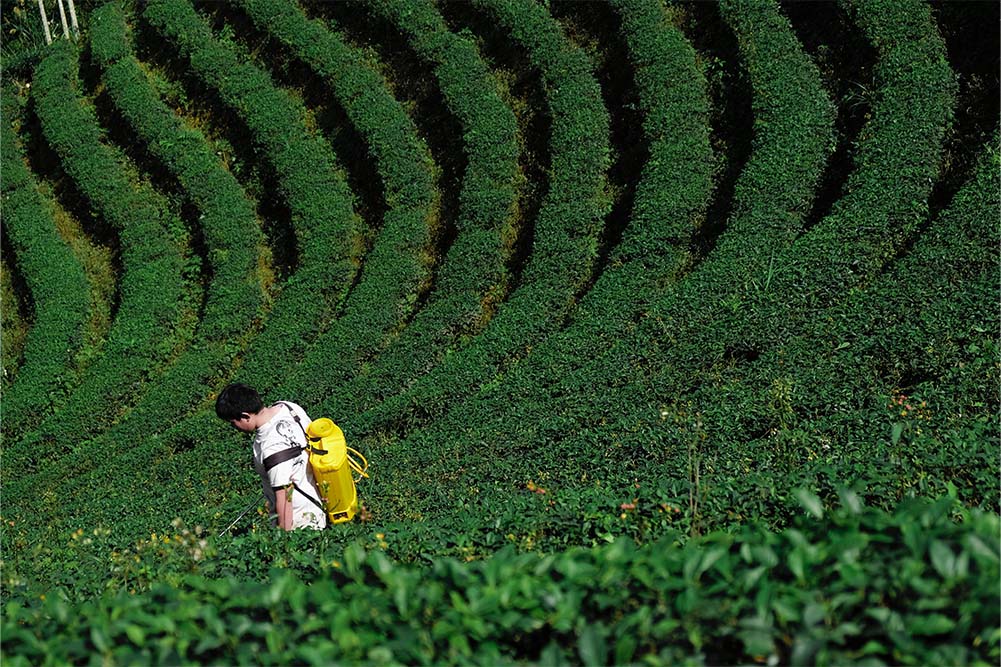Your Cart is Empty
January 11, 2022 3 min read

Pesticides affect farmers, since they are the only ones directly exposed to them. Right? This complacent way of thinking leads many Americans to unknowingly face the threats of pesticides on the daily. Pesticides do not just affect one demographic, but they infiltrate most households through tap water, something many public organizations continue to sweep under the rug.
Glyphosate, the world’s most commonly-used pesticide, is one of those threats, but it remains understudied and under regulated. Tests continually find it present in tap water in households across the United States, but what is known about this chemical?
Most commonly known as the main ingredient in Roundup, a pesticide sold globally for killing weeds, glyphosate is not just used in agricultural areas. In fact, glyphosate can also be found controlling weeds in parks, roads, railroad tracks, gardens, and cemeteries. From there, it can enter water supplies by way of wind and irrigation runoff. Studies continue being conducted on long term health effects of glyphosate, but it has been linked to cancer and kidney and liver damage.
Like any pesticide, questions of its safety arise before consuming produce or water doused in the weed killer. While short term effects of glyphosate exposure are unpleasant, like skin/eye irritation and nausea, they are not life threatening. Long term effects hold much more potential for fatalities, but currently only animal studies can be cited in risks associated with the pesticide. A study on Danish dairy cows demonstrates that “elevated glyphosate urinary levels have been linked to a marked increase in biomarkers indicative of damage to liver and kidney function.” Another study suggests that glyphosate damages DNA directly, which can lead to cancer.
In 2017, a groundbreaking lawsuit against Monsanto, the company that produces Roundup, directly linked use of the pesticide to lymphoma. A groundskeeper of a school near San Francisco proved that he contracted terminal cancer through repeated exposure to glyphosate, the first case recorded of glyphosate’s long term effect on humans. Despite evidence of cancer being linked to exposure to the pesticide, it remains unregulated and untested in most tap water.
With pesticides containing glyphosate so widely used across the country, testing one’s tap water will likely find it containing traces of the chemical. Irrigation runoff and wind brings it into water supplies that then bring it into households all over rural, urban, and suburban America. Water must be filtered to remove any health threats, like cancer and kidney and liver damage, to the consumer. Seychelle water filtration systems are independently tested to effectively remove harmful pesticides like glyphosate from tap water, ensuring the consumer can drink tap water risk-free of health effects.
Frequently Asked Questions
What is glyphosate?
Glyphosate is the most commonly used pesticide in the world. The most popular formula containing glyphosate is Roundup, which effectively kills nearly all species of weeds.
How does glyphosate enter tap water?
The pesticide is used everywhere, from parks in residential areas to fields and roads. Runoff caused by irrigation, as well as traces of the chemical picked up from wind and rain, allows glyphosate to enter water supplies.
What health risks does glyphosate pose?
Health risks associated with glyphosate include kidney and liver damage, although only animal studies have been conducted on these fronts. In 2017, however, the first case of glyphosate leading to cancer in humans was discovered, and now the chemical is considered “probably carcinogenic” by the International Agency for Research on Cancer.
How can I protect myself from consuming glyphosate?
While there is no doubt the chemical is present in tap water, it can be safely filtered out. Seychelle water filters allow peace of mind knowing that glyphosate can be stopped from being consumed.
Works Cited
“Glyphosate in Food & Water.”The Detox Project, 2021,https://detoxproject.org/glyphosate-in-food-water/. Accessed 30 December 2021.
“Is Glyphosate (RoundUp Weed Killer) In Your Water? It’s In Your Kids Breakfast Cereal…”Clearly Filtered, 2021,https://www.clearlyfiltered.com/blogs/blog/is-glyphosate-roundup-weed-killer-in-your-water-its-in-your-breakfast-cereal. Accessed 30 December 2021.
Kavanagh, Isabelle. “Glyphosate: How the Most Common Herbicide Puts Tap Water at Risk.”Tap Score, 30 April 2018,https://mytapscore.com/blogs/tips-for-taps/glyphosate-most-common-herbicide-puts-tap-water-at-risk. Accessed 30 December 2021.
Robinson, Kara M. “Herbicides and Your Health.”WebMD, 26 April 2021,https://www.webmd.com/cancer/herbicide-glyphosate-cancer. Accessed 30 December 2021.